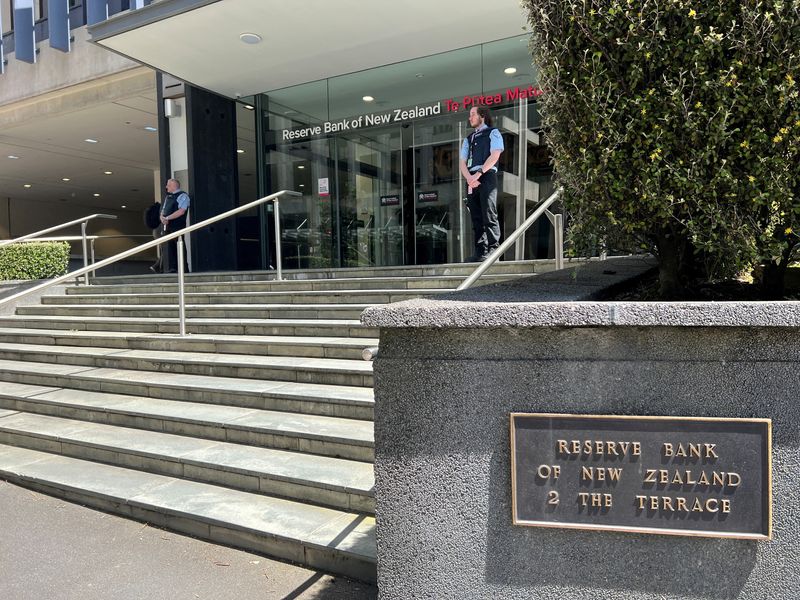By Stella Qiu
(Reuters) - New Zealand's central bank will be under greater pressure to ease policy aggressively this month as its rate meeting calendar leaves an unusually long three-month gap until its next gathering, arguing for extra insurance against an economic slump.
That is partly why markets and analysts have fully priced in another large 50-basis-point rate cut from the Reserve Bank of New Zealand at its last meeting for the year on November 27.
Even a whopping 75 basis point cut is also considered a possibility.
"I think front loading the rate cut has some optional values for the RBNZ. It means they can go into the Christmas break with a policy stance that's closer to neutral," said Faraz Syed, a senior economist at Citi Australia, which has called for 75 bp move in November. "That's what the economy requires."
The RBNZ cut the number of its policy meetings to seven from eight in 2016, which has allowed policymakers to enjoy a nearly three-month year-end break. That is unusually long for a major central bank - most central banks break for a month or two.
Michael Reddell, a former RBNZ official, said the RBNZ made the scheduling decision at a time when the cash rate was hardly being moved at all, which reduced the significance of the decision.
"I wouldn't be surprised if they were doing things over again they went back to eight... If I was sitting on the monetary policy committee today, I’d be certainly advocating a shift to eight meetings a year."
Just last week, the RBNZ sounded the alarm on further economic weakening even though rates have been chopped by 75 bps in just two meetings. Rising unemployment is likely to cause more borrowers to default on their mortgage payments over the next six months, it warned.
Between 2021 and August, the RBNZ had raised interest rates by 525 basis points to a 16-year high of 5.5% to stamp out surging inflation. Headline inflation, which peaked at 7.3%, slowed to 2.2% in the September quarter, back in the target band of 1-3%.
But that came with a hefty price. New Zealand's economy shrank from a year ago in the second quarter, with a gauge of living standards - gross domestic product per capita - falling for a seventh straight quarter.
The central bank won't meet again until February 19, a month after the inauguration of Donald Trump as U.S. president, when the economic landscape could be drastically different.
Even as the outlook for further U.S. rates has become more clouded, expectations that Trump's proposed policies including global tariffs will stoke inflation have seen borrowing costs surge globally. In New Zealand, a key short-term swap rate jumped 19 basis points last week, almost equal to a quarter-point hike in official rates.
That tightening comes at exactly the wrong time for the economy and again argues for drastic easing by the RBNZ.
"I think it does make it tricky that they have this long summer gap. It's basically 12 weeks between decisions and usually it's sort of six to seven," said Zoe Wallis, an investment strategist at Forsyth Barr.
50S AT LEAST
The prolonged downturn in the economy saw the jobless rate hit a near four-year high of 4.8% in the September quarter as employment dropped by most in four years.
Worryingly, there were clear signs young people were quitting the workforce, discouraged by a dearth of vacancies.
Goldman Sachs said a 75 bp move can be justified given how far rates are above the neutral rate of 3%, the long lags of policy and the near three-month meeting gap, but it is sticking with a 50 bp move to be followed up by another 50 in February.
That's partly due to comments from Governor Adrian Orr in late October that he was still a tad concerned about lingering inflation pressures. Rates on the way down probably will be more incremental than on the way up, Orr told an event in Washington.

Jarrod Kerr, chief economist at Kiwibank, agrees.
"Going 75 probably signals they’re a bit worried about things and that certainly wasn’t the sense we got from Adrian Orr... I think they will deliver 50 and then another one in February."